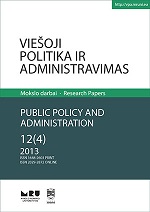Suvokiamas socialinis teisingumas ir jo reikšmė regionų plėtrai
Perceived Social Justice and Its Impact on Regional Development
Author(s): Marija Burinskienė, Vitalija RudzkienėSubject(s): Politics / Political Sciences
Published by: Mykolas Romeris University
Keywords: spatial development planning; social sustainability; social justice; values; migration; territorial development
Summary/Abstract: Increasing impact of global market economy today accelerates changes in people‘s living and working conditions, increases migration and significantly exacerbates social problems. The purpose of this study is to disclose the relationship between social justice and social sustainability, assess the set of social justice-forming factors and evaluate the assumptions and opportunities of implementation of the social justice principles in the spatial planning. The database of the international population survey was employed for the purpose of connecting perceived justice to macro socioeconomic factors. This connection provided insights into the perception of justice and its relationship with social sustainability indicators and revealed the problems and tendencies related to the implementation of the socioeconomic development models of the society. The methods of comparative analysis of scientific literature, statistical descriptive and correlation-regression analyses methods were applied for the investigation. The findings showed that despite similar economic development and the same socioeconomic development models, there were significant differences in the assessment of social justice of a country by its population, and countries with higher ratings of confidence after a while tended to have a more cohesive society with lower levels of migration and social exclusion. The investigation also confirmed occurrences of conflict at the micro level and the macro level in spatial planning procedures. Application of principles and methods of collaborative public management could be considered as the possible solutions for emerging issues.
Journal: Viešoji politika ir administravimas
- Issue Year: 12/2013
- Issue No: 4
- Page Range: 595-609
- Page Count: 15
- Language: Lithuanian

